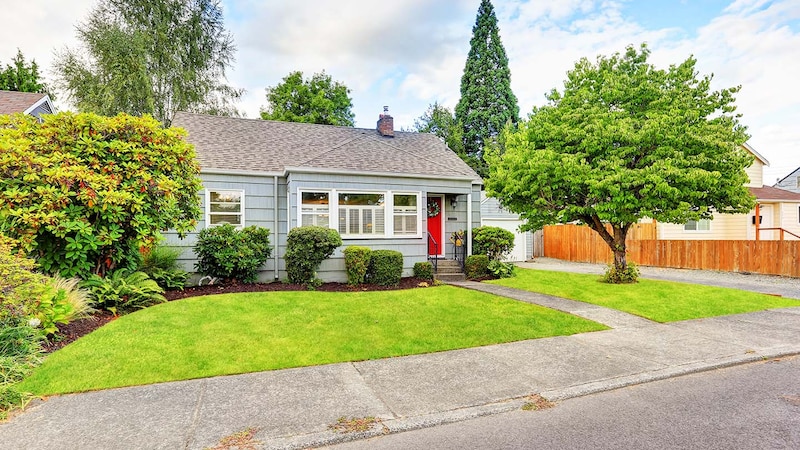The effects of recessions on mortgages

Many homebuyers may feel that taking out a mortgage during a recession is too risky. While recessions are short term pauses in an otherwise expanding economy, they affect real estate markets and interest rates.
However, this pause may be a good time to buy or refinance a home. Talk to your lender to learn how recessions affect interest rates, how you can lower your mortgage rate and how to reduce your homebuying risk.
What is an economic recession?
Recessions are a natural part of an economy's cyclical nature. What goes up, must come down. Think of economic recession like a balloon that begins to deflate. A healthy, sustainable economy includes factors like:
- Low unemployment
- Income security
- Retail market growth
- Increases in manufacturing
- Increases in housing starts and homeownership
- Steady or climbing interest rates
Recessions can hit suddenly, or an economy can slowly ease into one. Either way, recessions are marked by several consecutive months of high unemployment. Business earnings may drop as people tend to spend less in uncertain times. You also might find that manufacturing production slows as companies watch spending, which can cause layoffs. Wholesale and retail markets also feel the heat as consumer confidence ebbs. These indicators tend to work together, creating the downturn.
What drives recessions?
Anything that shocks an economy suddenly can drive an economy into a recession. It can be caused by people or nature. Buying a home can be stressful in the best of times. Making long-term financial decisions like buying a home during a recession can amplify stress — especially if you're not sure how the homebuying process works.
Who determines the beginning and the end of a recession?
The National Bureau of Economic Research (NBER) defines a recession as “a significant decline in economic activity that is spread across the economy and that lasts more than a few months"Opens overlay. Economists look to past indicators to determine when a recession starts by doing a deep dive into where the economy's been. The NBER determines a recession's end as the date where the economic downturn begins to go up and stays up. A recession can last for months.
A recession is not the same as a depression, which can last for years. Once a recession passes, economic expansion begins again. Markets rise and consumer confidence picks up. Interest rates that may have fallen at the beginning of a recession may begin to increase as a new expansion period begins.
How recessions affect interest rates and mortgages
When consumers aren’t spending, money doesn't flow through the economy freely. During a recession, the Federal Reserve may adjust interest rates in hopes of minimizing economic disruption. Sometimes this helps the markets stabilize and consumer confidence to rise so that more spending takes place. In any case, lenders use that adjusted interest rate to help set their own rates for loans and mortgages.
The issue is that people often are reluctant to spend and would rather save money during a recession, which means loans aren't in demand. There are many types of mortgages and all of them have their pros and cons whether in good times or in a recession. Deciding how much risk is too much is both a personal decision and one that your lender can help you determine.
The pros and cons of buying a home during a recession
Recessions can be great times to buy a home. Sellers are motivated, interest rates may be lower and there may be less competition among buyers. The combination of lower interest rates and potentially lower housing prices can bring homes that were out of reach before the recession within reach.
Pro: It's a buyer's market, right?
In real estate lingo, a buyer's market occurs when there are more houses on the market than there are buyers. Supply exceeds demand with houses often listed at bargain prices. Other factors contributing to a buyer's market may include:
- Lower interest rates
- Good supply of comparable homes in the neighborhood
- Lower consumer confidence, meaning less competition
When mortgage interest rates are low and you have a steady income, you may decide that the benefits of homeownership outweigh the risks of buying, even in tough economic conditions. Sellers may be more motivated to negotiate on the price or to make concessions to buyers. There may also be short sales and foreclosures due to the recession, giving you the opportunity to find a bargain.
Keep in mind that if supply and demand drop roughly at the same time, a recession won't make much difference in home prices. What may make a difference is interest rates.
Cons: Understanding the risks
The Great Recession of 2008 left an indelible mark on future real estate markets. During that recession, more homeowners were upside-down with their mortgages meaning they owed more than their house was worth. With unemployment wreaking havoc and consumer debt high, lenders were forced to assess credit scores more stringently.
The credit score you had before the recession may not be high enough to get a mortgage to buy the home you want during the recession.
Recessions can pose other risks for buyers:
- You may be competing with investors who are buying up properties to rent out.
- Short sales and foreclosures often mean that sellers, which may include banks, may sell properties as they sit with no repairs or warranties.
- Concessions for things such as repairing a roof or paying closing costs may be less negotiable.
- Economic factors that adversely impact others may impact you as well
Ways you can mitigate these and other risks include:
- Increasing your down payment
- Improving your financial picture by paying down debt
- Not opening any new lines of credit, and checking your credit report for any discrepancies
Financing a home during a recession may require stronger credit and a substantial down payment so that there’s minimal risk for the lender.
Remember that recessions don't last forever
Be patient. Do your homework and get your financial resources in order so you can move swiftly. The home you want may not be available a few days from now if it's truly a buyer's market. Lower interest rates aren't a given with every recession, but if you find lower than average interest rates, it may be tempting to buy now and not wait until a recession is over.
Sooner or later, interest rates will begin to go back up. Here are some signs that the economy is rebounding:
- Mortgage rates on the rise
- Existing home sales level off
- Increasing home prices
- Residential investment momentum increases
Homes are a financial investment. It’s important to look at your future goals, not just at the immediate effects of a recession. Talk to a Home Lending Advisor to see what mortgage options, terms and rates might work for your needs.



